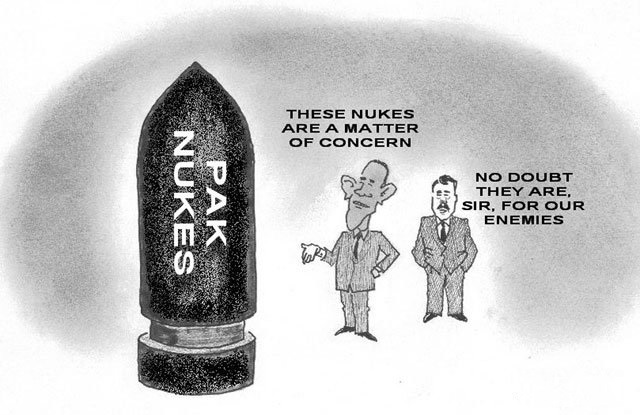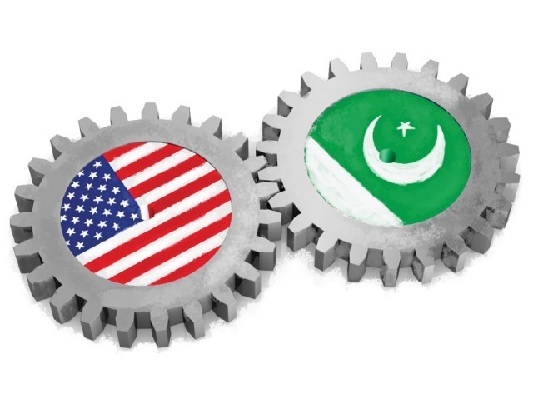By Nadeem Mumtaz Qureshi
The relationship between the United States of America and Pakistan is not monolithic. It consists of three distinct strands each of which has to be assessed separately. These are: The relationship with Pakistan’s military, its civil and political establishment and finally its people.
The most important of these strands is the relationship with the military. This is because, even in democratic Pakistan, it is the military that is the ultimate arbiter of matters of national security.
Historically the relationship has been very close. It began soon after the country’s formation in 1947 and strengthened as the Cold War started to ramp up. India’s lurch toward Socialism brought it in the fold of the USSR. This led to a congruence of interests: It became important for the US to have an ally in the region. And Pakistan’s generals saw access to US military assistance as a crucial counterbalance to India’s military strength. So started a lasting if sometimes turbulent relationship.
The Soviet invasion of Afghanistan in 1979 enhanced the relationship. Former President Gen. Ziaul Haq willingly and with much popular support made Pakistan the spearhead of the ultimately successful campaign to oust the USSR from Afghanistan.
Many years later, in the aftermath of 9/11, the military ruler of the day, Gen. Pervez Musharraf, was obliged to make the most fateful decision of his career. With reluctance, and great public opposition, he committed Pakistan to a new war in Afghanistan a war that still continues to simmer. This so-called war on terror has cost Pakistan dearly and its lasting consequences continue to shake the foundations of the state.
The relationship survived because of the perception by both sides that they need the other. But the world has moved on. And increasingly there is evidence that the bonds holding the two allies are fraying.
America first. The need for a counterbalance in the region disappeared with the demise of the USSR in 1991. The period following this demise was characterized, as expected, by a weakening of the US-Pakistan relationship. Things deteriorated when the US imposed sanctions on Pakistan following a successful nuclear test in 1998. The following year Gen. Pervez Musharraf overthrew the government of Prime Minister Nawaz Sharif. This added further strain on an already tenuous relationship.
Then came 9/11 and suddenly America needed Pakistan again. Gen. Musharraf, almost overnight, went from persona non grata to America’s favorite foreign general.
The job in Afghanistan is not done. But America, or rather the American people have had enough. They have paid with taxes and blood for arguably unnecessary wars in Iraq and Afghanistan. There is no appetite for more.
In the meantime, India has done an about turn. Socialist leanings have been abandoned. Capitalism has been embraced. And the country has become an economic powerhouse. Indeed, America views India now as an important economic partner. A symbiotic nexus links the two countries especially in information technology and outsourcing. All this has meant that Pakistan is once again diminished in its relevance to the way in which the US sees the world.
And Pakistan? History has taught Pakistan’s military that the US is an unreliable partner. The relationship is of value so long as it serves US interests. When those interests shift, Pakistan becomes redundant. For this reason the military has developed close tie with China.
There was a time when China could not compete with US weapons systems due to the vast technological superiority of the latter. But things have changed. The Chinese have spent the past few years investing heavily in defense technology. And, across the board, their weapons systems are able to match, or at least come very close, to the best that America has to offer. Not only is Chinese technology good, it is accessible sometimes at a fraction of the cost.
Add to this that the Chinese do not concern themselves with what happens inside Pakistan. Democracy or no democracy they are happy to continue their relationship. America, on the other hand, is a tempestuous partner. It imposes sanctions at the drop of a hat. 
So Pakistan’s military has hedged its bets. The relationship with the US remains but is no longer crucial. The relationship with China has become indispensable. As for the US relationship with the civil and political establishment: This is predicated on the widespread belief that political change in Pakistan cannot happen without America’s blessing. Setting aside the validity of this belief, the mere fact that people believe it to be true gives the US disproportionate influence. Politicians especially are keen to please. The civil bureaucracy more or less falls in line.
The problem is that Pakistan’s politicians are perhaps its least favorite people. Corrupt, self serving, incompetent, disconnected even disdainful of the people they allegedly represent they live in a world of their own.
Indeed it is the common people that America should be most concerned about. And here there is a problem. Talk to anyone on the street or, as is more often the case, the dirt lane, and ask them what they think about the US. The response will almost invariably range from distrust at best, to loathing at worst.
If it does not matter to the US what the common Pakistani thinks then there is no need to do anything. But if it does matter then a strategy must be devised to improve public perception of the US. An important first step is a better understanding of how the common people think. And here there is a weak link.
In shaping Pakistan policy the US relies, in addition to its diplomatic missions, on Pakistani analysts some of whom work at US based think tanks and others for the US government. The problem is that most if not all of these analysts are from a miniscule English-speaking Pakistani elite that is as removed from the common Pakistani as Marie Antoinette was from her people.
The same applies to US diplomatic missions in Pakistan. Clearly issues of security and language barriers prevent American diplomats from descending in the villages and bazaars to gauge opinion. Understanding how common Pakistanis think is of course the starting point to devising a strategy. But it may be useful for the US to keep at least one general principle in mind: Do not attempt to manipulate political outcomes. In 2007 the US brokered, pressured may be a better word, a deal between Benazir Bhutto and Gen. Pervez Musharraf. This allowed the former to return to Pakistan and participate in elections. But it also involved the passage of what is known as the National Reconciliation Ordinance (NRO).
The NRO pardoned a veritable galaxy of political crooks and criminals who had looted public wealth and fled the country. And many of these found their way back into the corridors of power to once again plunder an already benighted people. All this is in the past. Can the future be better for this checkered relationship? It can. But the onus to make it so falls on the US. If it continues to treat Pakistan as a disposable commodity to be used and discarded when its own agenda of the time is complete then there will be no change. The only way to build a strong relationship is to base it on principle and the recognition that the weak must be treated with respect and dignity.
‘Courtesy Arab News’


